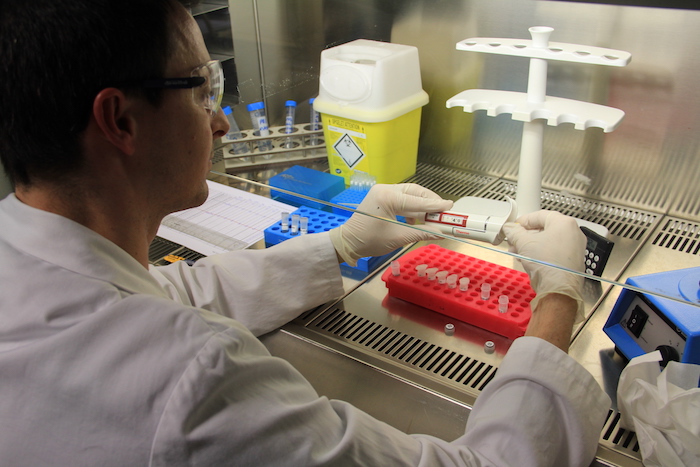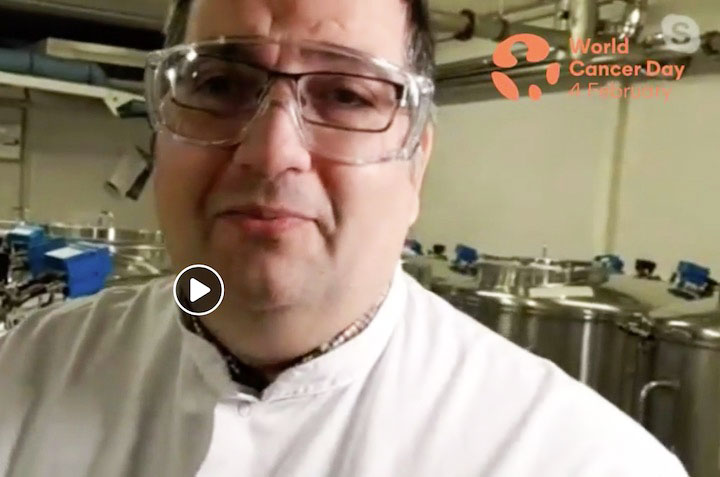About
Laboratory Support, Biobanking, and Services (LSB) is a cross-cutting function of IARC. LSB is part of the Nutrition and Metabolism Branch (NME) and liaises closely with the Administrative Services Office (ASO) and with other research Branches to provide core laboratory and biobank services in order to support ongoing research across the continuum of activities at the Agency, as well as conducting its own research activities. In addition, LSB provides laboratory safety advice and training across the Agency and serves as the interface with regulatory authorities and external collaborating bodies on these issues. The IARC Biobank is a reference point for many studies across the Agency.
LSB also provides expert support and leadership to biobanks internationally through the Biobank and Cohort Building Network (BCNet) focusing on low- and middle-income countries (LMICs). The LSB-led research activities and available expertise provide the foundation for the synthesis of this information into educational materials and international guidelines. This includes the development of international best practices and standards in biobanking and digitization, as well as the appropriate training in close collaboration with the Learning and Capacity-Building Branch.
These activities are briefly presented here. (Further details can be obtained by contacting LSB at ibb@iarc.who.int.)
Laboratory Services
LSB ensures that the laboratory and associated digital environment is conducive to work and that optimal laboratory services are provided for research. Common laboratory services are: (i) the management of the IARC electronic sample management system (SAMI), (ii) the central laboratory store, (ii) quarantine and shipment, (iii) the Electronic Laboratory Notebook verification, (iv) the glassware washing facility, (v) the pipette checking and mycoplasma testing, and (vi) the cell retrieval/cell freezing services. In addition, LSB operates the automated DNA extraction and aliquoting facility.
Together with the IARC Laboratory Steering Committee, LSB oversees the common laboratory services and platforms and ensures that the equipment is well maintained. The interaction between laboratory-based and epidemiological research is enhanced through the upgrading, updating, and acquisition of state-of-the-art scientific instruments and the provision of sufficient sample storage capacity.
In collaboration with the IARC Occupational Health and Safety Committee, LSB manages aspects of health and safety issues, such as the online availability of the Safety Data Sheets for all reagents used or stored in IARC laboratories, the installation of “man-down” detectors and monitoring systems for use in specific isolated rooms, and the safety training of personnel.
IARC Biobank
IARC hosts one of the largest and richest collections of biological material in the world, with more than 6 million samples and an emphasis on gene–environment interactions. The IARC Biobank maintains biological sample collections from international collaborative studies and also acts as a custodian for collections from consortia and research networks from LMICs.
In addition, the IARC Biobank provides pre-analytical services and operates on a cost-recovery basis. The acquisition of equipment to extract nucleic acids from material other than fresh-frozen blood expanded the scope of the service platform to include extractions from tissue, saliva, and dried blood spots. Stringent quality control measures are in place to ensure the high quality of samples. The IARC Biobank received an “Infrastructures en Biologie Santé et Agronomie” (IBiSA) label in 2024 and is in the process of acquiring ISO 20387 “Biotechnology & Biobanking” accreditation. It participates in international proficiency testing schemes, with consistent high scores.
Biobank and Cohort Building Network (BCNet)
A significant increase is expected in the burden of noncommunicable diseases in LMICs over the next decades. However, the genetic background of LMIC populations is frequently not represented adequately in medical research and/or drug development studies. The result is solutions that are often not directly applicable or efficacious to populations in LMICs.
To address this need, BCNet was created in 2013 by IARC and partners such as the Center for Global Health (National Cancer Institute, USA) to support the establishment of laboratory infrastructure in LMICs with appropriate sample and data management. The network has since developed into a global focal point, incorporating 54 institutions in 25 countries. BCNet leads in the development of harmonized protocols, best practices, and standards, as well as in biobanking research.
Membership in BCNet is free, and since 2018 BCNet members can become members of the International Society for Biological and Environmental Repositories (ISBER) at no additional cost. BCNet members enjoy free access to educational webinars by IARC and partners, a newsletter published every 4 months containing news and information from members, grant and collaboration opportunities, and the latest relevant manuscript publications (BCNetters are available at https://bcnet.iarc.who.int/about-bcnet/newsletters/). BCNet members are also provided with free access to educational materials through the IARC Learning portal, where a dedicated learning platform on biobanking is available.
Education and Guidelines
LSB’s expertise is used in the creation of evidence-based guidelines and standards in the field. LSB, in collaboration with the Learning and Capacity-Building Branch, has created a dedicated learning platform on biobanking, available through the IARC Learning portal. Topics covered include ethical, legal, and social issues (ELSI) and governance aspects, physical and digital biobanking infrastructure, collection and management of samples and data, and bioinformatics. Additional collaboration with the World Health Organization (WHO) and the WHO Academy have resulted in LSB providing strong input on the global training content. Furthermore, LSB provides ongoing training and internship opportunities, in close collaboration with the École Supérieure de Biologie, Biochimie, Biotechnologies (ESTBB) at the Université Catholique de Lyon; the Université Côte d’Azur (France); Shanghai Jiao Tong University (China); Alexandria University (Egypt), and others.
In terms of guidelines and standards, LSB developed Common Minimum Technical Standards and Protocols for Biobanks Dedicated to Cancer Research (IARC Technical Publication No. 44), published in 2017. This book has become a global reference for research infrastructure in LMICs. Similarly, the recent publication on Digitalization of Medicine in Low- and Middle-Income Countries has become a global reference point. In close collaboration with the Evidence Synthesis and Classification Branch, LSB is contributing to the International Collaboration for Cancer Classification and Research (IC3R). In addition, LSB represents IARC in the ISO Working Group on Biotechnology standards (ISO/TC 276 – Biotechnology), as well as in the pan-European Union Biobanking and BioMolecular resources Research Infrastructure–European Research Infrastructure Consortium (BBMRI-ERIC) and the European Open Science Cloud (EOSC), contributing its expertise to the further development of standards and guidelines.



